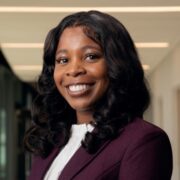Taking a Different Path: Alternative Legal Careers
 By Maya Davis
By Maya Davis
On March 22, 2024, the New Lawyers in Practice Committee of the North Carolina Bar Association hosted a panel event: “Taking a Different Path: Alternative Legal Careers.” The dynamic panel included the following speakers: Alexandra Davis, Managing Editor at Public Discourse; Debra Hamilton, Certified Mediator (Animal Conflicts); Kearra Richardson, Project Review Analyst; Sarah Clayton, Director of ADR at the American Arbitration Association; and Najib Azam, Senior Risk Manager at UBS.
Every story has a beginning, and at the beginning of the event, panel attendees first learned about the pivotal moment, or moments, that led the panelists to choose an alternative career path. While some panelists knew right away that they didn’t want to practice or litigate, some panelists litigated and stepped away from litigating after several years. A common thread seemed to be that everyone found their perfect niche and had a unique story to finding that path, whether they discovered it immediately after law school or years later.
Another commonality every panelist shared was the benefit of having a Juris Doctor (J.D.) degree. Najib Azam believes this degree can set you apart in non-attorney roles. The J.D. will often lead people to hold you to an esteemed degree, but with great power comes great responsibility. Going through the rigor of the law and the bar often reflects the analytical and problem-solving skills people have. Kearra Richardson and Debra Hamilton encouraged the guests to obtain additional certifications which will allow for greater knowledge, new skills, and better communication in an ever-changing society.
Because the work we do is hard enough, it is imperative to have a strong work-life balance. We asked the panel what work-life balance looked like for them and how it differed when they were practicing law. Everyone agrees the beauty of remote work has shifted the way we work, live, and interact. Alexandra Davis notes the key to work-life balance is to adapt, pivot, and be open to unexpected changes when needed. Sarah Clayton believes that you must first know your priorities and purpose, and fight for that when trying to find a work-life balance.
Though one may get settled in with the work that they are doing, opportunities to pivot may arise. We asked the panelists if they would ever consider returning to the practice of law or changing their alternative careers. Each panelist either answered that they would not at all, or that they would not foreclose any opportunity to pivot, should the right opportunity arise. This seemed to emphasize that when we are faced with such a situation, we need to conduct an evaluation of what is important and what our goals are.
Finally, learning from your experience is essential. In that vein, we asked each panelist if there was something they wished they would have known prior to choosing an alternative career path. This proved to reveal several helpful tips:
- Don’t get into something because you’re trying to escape something else.
- Have a clear understanding of your ethical responsibilities as a lawyer, especially in situations where people call upon you for advice in areas of the law that you don’t specialize in.
- Put up boundaries gently but firmly.
- Know what’s out there when it comes to alternative legal careers.
- From a financial perspective, know your loan options.
- Gain proficiency in common workplace platforms, specifically technological platforms
- Explore and expand your network as much as possible.
- Never be afraid to ask.
Each panelist had their own unique story and experience, which translated to their sharing of important information and advice that can be more than helpful to new lawyers in the profession. The New Lawyers in Practice Committee is more than grateful for the wisdom and insight that each panelist was gracious enough to share.
